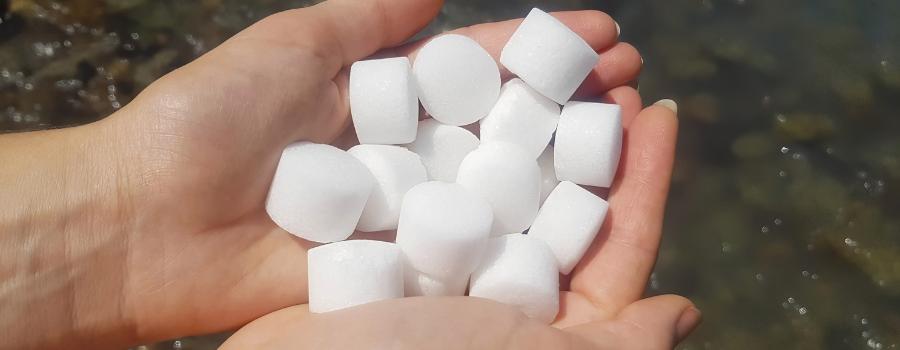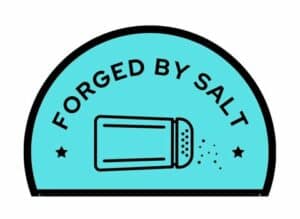There are many household appliances that can use salt and many wonder if these appliances can use salts interchangeably. For instance, can you use pool salt in a water softener?
In general, pool salt can be used in a water softener. However, you should know note that not all pool salts are created equal, and some may contain additives that can damage your water softener or leave unwanted residue in your water.
Before using pool salt in a water softener, it’s important to do your research and choose a high-quality, pure salt that is specifically designed for use in water softeners. Ultimately, the decision to use pool salt in a water softener will depend on your specific needs and budget and this article hope to take some of the guess work out of that decision.

What is Pool Salt
Pool salt, also known as sodium chloride, is a type of salt commonly used in swimming pools to maintain the proper chemical balance of the water. It is made up of sodium and chloride ions, which help to keep the water clean and clear.
Pool salt is different from table salt, as it is not iodized and does not contain any anti-caking agents or other additives. This makes it a pure form of salt that is safe for use in swimming pools.
Pool salt is typically sold in large bags, with a grain size that is specifically designed for use in swimming pools. It is important to use the correct type of salt for your pool, as using the wrong type can lead to damage to your pool equipment and potentially harm swimmers.
When added to a swimming pool, pool salt dissolves quickly and evenly, helping to maintain the proper chemical balance of the water. It is an affordable and effective way to keep your pool clean and clear, and is a popular choice among pool owners.
What is a Water Softener
A water softener is a device that helps remove minerals that cause hard water, such as calcium and magnesium, from the water supply. Hard water can cause several problems, including clogged pipes, water stains, and soap scum buildup. Water softeners work by exchanging the hard minerals for soft ones, such as sodium or potassium, through a process called ion exchange.
Water softeners typically consist of two tanks: a resin tank and a brine tank. The resin tank contains tiny beads that are coated with a salt solution. When hard water enters the resin tank, the hard minerals are attracted to the beads, and the soft minerals are released into the water. The brine tank contains a saltwater solution that is used to recharge the resin beads periodically.
There are several types of water softeners available, including salt-based, salt-free, and magnetic. Salt-based water softeners are the most common and effective type, but they require regular maintenance and the addition of salt to the brine tank.
Is it Okay to Use Pool Salt in a Water Softener
While it is generally okay to use pool salt in your water softener, there are a few caveats. Pool salt is typically made of larger salt crystals than water softener salt and they can clog your softener.
However, if you have a water softener that is designed to handle larger salt crystals, using pool salt may be an option. It is important to check the specifications of your water softener before using pool salt. Some water softeners are designed specifically for use with pellets or fine-grain water softening salts.
Another consideration is the type of salt you are using. Pool salt is typically made of sodium chloride, which is the same type of salt used in water softeners. However, some people choose to use potassium chloride instead of sodium chloride in their water softener. If you are using potassium chloride, you should not use pool salt as it is not compatible with this type of salt.
While it is possible to use pool salt in a water softener, it is not recommended unless your water softener is specifically designed for use with larger salt crystals. It is important to check the specifications of your water softener and to use the appropriate type of salt, whether it be sodium chloride or potassium chloride.
Potential Damage to Your Water Softener
Using pool salt in a water softener can cause potential damage to the system. The brine tank and control valve are two areas that can be affected by the use of pool salt.
Pool salt contains additives that are not found in regular water softener salt pellets. These additives can cause salt bridging and clogging in the brine tank, which can disrupt the regeneration process. This can lead to a buildup of dense salt in the tank, which can cause overflow and damage to the control valve.
Additionally, pool salt contains a higher concentration of magnesium sulfate and alkaline, which can lead to scaling and buildup in the resin bed. This can cause the resin to become clogged and disrupted, resulting in hard water and a change in texture of the water.
Furthermore, the use of pool salt can also cause corrosion in the tank and valve due to the presence of chlorine. This can lead to a decrease in the lifespan of the system and the need for costly repairs.
Overall, it is recommended to use only salt pellets specifically designed for water softeners to avoid potential damage and ensure the longevity of the system.
How to Use Pool Salt in a Water Softener
Using pool salt in a water softener can be a cost-effective way to soften hard water. Here are some steps to follow:
- Dissolve the Salt: Pool salt is usually sold in large crystals that need to be dissolved before use in a water softener. To dissolve the salt, pour it into a container filled with water and stir until it is completely dissolved.
- Clean the Water Softener: Before adding the pool salt, it is important to clean the water softener to remove any impurities or particles that may have accumulated. This can be done by running a cleaning cycle or manually cleaning the valves and other equipment.
- Add the Salt: Once the salt is dissolved and the water softener is clean, add the salt to the brine tank. The amount of salt needed will depend on the size of the tank and the purity level of the salt. It is important to follow the manufacturer’s instructions for the correct amount of salt to use.
- Draw out The Hard Water: After the salt is added to the brine tank, the water softener will begin to draw out the hard water from the household. This process can be slow, especially if the water is very hard. It may take several days for the water softener to reach its full softening capacity.
- Monitor the Salt Level: It is important to monitor the salt level in the brine tank and add more salt as needed. This will ensure that the water softener continues to function properly and that the water remains soft.
- Consider Using Solar Salt: While pool salt is a cheaper alternative to table salt, it may contain impurities that can damage the water softener over time. Using solar salt, which is designed specifically for water softeners, can help maintain the purity level of the water and extend the life of the equipment.
Using pool salt in a water softener can be an effective way to soften hard water. By following these steps and monitoring the salt level, homeowners can enjoy the benefits of soft water without the high cost of traditional water softening methods.
Benefits of Using Pool Salt in a Water Softener
Using pool salt in your water softener can offer several benefits, including:
- Cost Savings: Pool salt is often less expensive than traditional water softener salt, which can save you money in the long run.
- Soft Water: Pool salt can effectively soften water, making it feel smoother and more pleasant to use.
- Reduced Residue: Pool salt can help reduce the amount of residue left behind on surfaces, such as dishes and shower doors.
- Sanitization: Pool salt can help sanitize water, which can be especially beneficial for swimming pools and hot tubs.
- Lower pH Levels: Pool salt can help lower the pH levels of water, which can help prevent damage to pool surfaces and reduce skin irritation.
Using pool salt in a water softener may not be suitable for all situations. For example, if you have a freshwater well, you may not need to soften your water at all. Additionally, pool salt may not be appropriate for use in all types of water softeners, as it can cause bridging or other issues if not used correctly.
Tips for Using Pool Salt in a Water Softener
Using pool salt in a water softener can be a cost-effective solution, but it’s important to keep a few tips in mind to ensure it works properly:
- Use only high-quality pool salt that is free of dirt and debris. Impurities can cause clogs and damage to the water softener system.
- Check the manufacturer’s instructions for the recommended amount of pool salt to use in the water softener. Adding too much or too little salt can affect the performance of the system.
- Regularly clean the brine tank to prevent buildup of salt and other contaminants that can affect the effectiveness of the water softener.
- Test the water regularly to ensure the water softener is working properly. Hard water can cause damage to appliances and fixtures over time.
- Consider using a pre-filter to remove larger particles and sediment from the water before it enters the water softener. This can help prolong the life of the system and prevent clogs.
